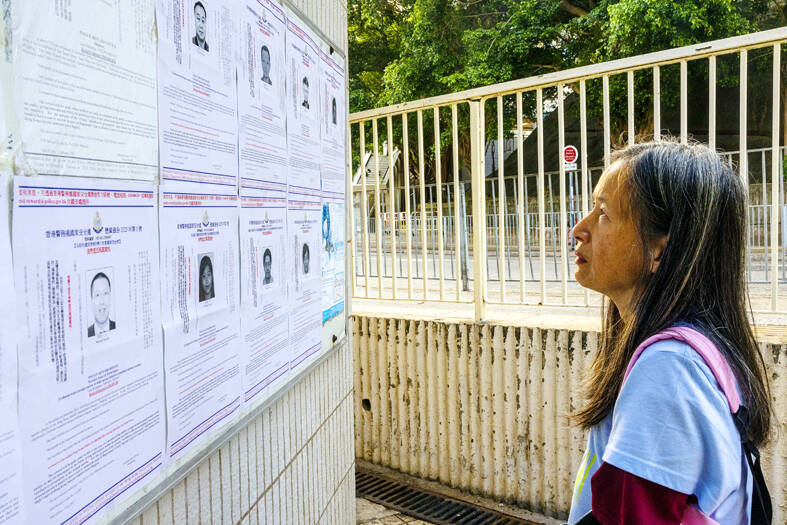Hong Kong authorities yesterday strengthened a crackdown on 16 overseas-based activists who were previously targeted by bounties on suspicion of endangering national security, implementing measures that include banning financial support to them and canceling most of their passports.
The activists were among 19 people who were targeted with arrest warrants last month for alleged roles in Hong Kong Parliament, a group the police called a subversive organization abroad.
Three of the original 19 activists were already targeted by similar measures last year.

Photo: AP
Hong Kong Secretary for Security Chris Tang (鄧炳強) banned providing funds or economic resources to the 16 activists, including Victor Ho (何良懋), Australian academic Feng Chongyi (馮崇義) and US citizen Sasha Gong (龔小夏), the Hong Kong Government said in a statement.
Travel documents were canceled for 12 of the 16 who hold Hong Kong passports.
The government also prohibited properties from being leased to the people on the list or forming joint ventures with them. Anyone contravening the orders risks a penalty of up to seven years in prison.
The 16 activists are hiding in the UK, the US, Canada, Germany, Australia, Thailand and Taiwan, among other regions, the government said, accusing them of continuing to engage in activities endangering national security.
The notice also accused them of intending to incite hatred against Beijing and Hong Kong through smear and slander.
“We therefore have taken such measures to make a significant impact,” the statement said.
Beijing imposed a national security law on the territory in 2020 that has effectively wiped out most public dissent following huge anti-government protests in 2019. Many activists were arrested, silenced or forced into self-exile.
The measures announced yesterday were issued under the powers granted by Hong Kong’s homegrown national security law enacted last year.
The arrest warrants issued last month have drawn criticism from foreign governments.

Indonesia yesterday began enforcing its newly ratified penal code, replacing a Dutch-era criminal law that had governed the country for more than 80 years and marking a major shift in its legal landscape. Since proclaiming independence in 1945, the Southeast Asian country had continued to operate under a colonial framework widely criticized as outdated and misaligned with Indonesia’s social values. Efforts to revise the code stalled for decades as lawmakers debated how to balance human rights, religious norms and local traditions in the world’s most populous Muslim-majority nation. The 345-page Indonesian Penal Code, known as the KUHP, was passed in 2022. It

‘DISRESPECTFUL’: Katie Miller, the wife of Trump’s most influential adviser, drew ire by posting an image of Greenland in the colors of the US flag, captioning it ‘SOON’ US President Donald Trump on Sunday doubled down on his claim that Greenland should become part of the US, despite calls by the Danish prime minister to stop “threatening” the territory. Washington’s military intervention in Venezuela has reignited fears for Greenland, which Trump has repeatedly said he wants to annex, given its strategic location in the arctic. While aboard Air Force One en route to Washington, Trump reiterated the goal. “We need Greenland from the standpoint of national security, and Denmark is not going to be able to do it,” he said in response to a reporter’s question. “We’ll worry about Greenland in

PERILOUS JOURNEY: Over just a matter of days last month, about 1,600 Afghans who were at risk of perishing due to the cold weather were rescued in the mountains Habibullah set off from his home in western Afghanistan determined to find work in Iran, only for the 15-year-old to freeze to death while walking across the mountainous frontier. “He was forced to go, to bring food for the family,” his mother, Mah Jan, said at her mud home in Ghunjan village. “We have no food to eat, we have no clothes to wear. The house in which I live has no electricity, no water. I have no proper window, nothing to burn for heating,” she added, clutching a photograph of her son. Habibullah was one of at least 18 migrants who died

Russia early yesterday bombarded Ukraine, killing two people in the Kyiv region, authorities said on the eve of a diplomatic summit in France. A nationwide siren was issued just after midnight, while Ukraine’s military said air defenses were operating in several places. In the capital, a private medical facility caught fire as a result of the Russian strikes, killing one person and wounding three others, the State Emergency Service of Kyiv said. It released images of rescuers removing people on stretchers from a gutted building. Another pre-dawn attack on the neighboring city of Fastiv killed one man in his 70s, Kyiv Governor Mykola